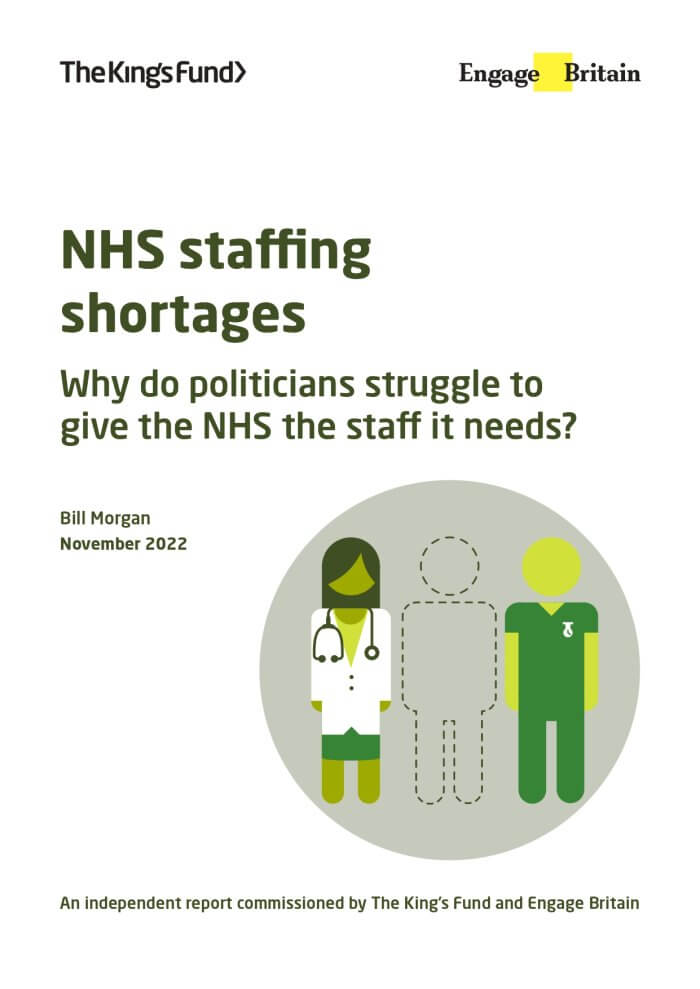This is Blog No 12
The phrase ‘elephant in the room’ is clearly over-used.
Yet it is an accurate description of a growing problem that affects the use and design of public engagement and consultation initiatives. Something so enormous that it hangs over the substance of a consultation, casts doubt upon the viability of proposals and influences consultee reactions.
Let us start with the NHS.

As previewed in my blog of 16th January we will shortly enter into a period where Integrated Care Boards (ICBs) in England consult extensively over their Five-year plans. Those plans will surely be impacted by the chronic workforce shortages that continue to bedevil the service. In fact, they are getting worse. Right now, across the country, there is a vacancy rate of 7% among doctors, and 12% among nurses. And there are shortages in virtually every healthcare profession.
For these and other statistics I am indebted to a recent and first-rate Report from the Kings Fund and Engage Britain. It is called NHS staffing shortages: Why do politicians struggle to give the NHS the staff it needs? For anyone genuinely puzzled by our continued inability to solve this problem, it is as succinct and informative an analysis as I have encountered.
Its conclusions are that there are many obstacles preventing politicians from addressing the issue, and that false Treasury assumptions led to as systemic undertraining of key disciplines. Then there are political realities leading to “long-term education and training budgets … raided to tackle short-term pressures.”
Might we have a case in point right now? Yesterday the Government announced a Major plan to recover urgent and emergency care services committing to 800 new ambulances and 5,000 extra beds. As the Government Press Release makes clear, everyone welcomes this news. Only diehard sceptics question whether the required manpower will be found.
However, here and now, in 2023, there are rather a lot of diehard sceptics, and they may well reside in communities near you!
So, when Five-Year plans are developed and presented to Health & Wellbeing Boards in the coming weeks, will they be nodded through and approved for consultation with the wider public? Or will there be some soul-searching about the ability to deliver?
I have been looking at several published strategies and plans. Many have laudable objectives but firm, measurable commitments are in short supply. Improvements are promised – often quite dramatic as there are so many health inequalities to address. But if these are contingent upon finding extra resources, any failure to provide them means that these worthy aims can only be delivered by taking resources from other services. The NHS is less good at explaining this or managing a mature dialogue on the inevitable conflict of priorities.
Money is one resource, but the more intractable problem has been the workforce shortages. In the coming consultations, the NHS will need to be crystal clear which of their plans are assured of delivery and which are contingent upon Government and other agencies addressing the unresolved issues. Without this candour, we will merely create even more mistrust and disillusion.
We are at risk of similar demoralisation in other sectors. Climate change is one.
The Welsh Government has just published a new consultation on reviewing its renewable energy targets. It is making optimistic noises whilst trying to secure public support for more ambitious plans. It includes some excellent proposals. But here’s the catch. As it fairly points out, “Our targets will only be met if we have the supporting infrastructure required to support a renewables-based system.” It needs what it calls ‘anticipatory investment’ in UK-wide networks etc and so the consultation becomes akin to asking people “If we can get this money spent by someone else, would you favour these proposals …?” Another elephant – albeit in a different room.
A third example can be found in a High Court judgment handed down today. In Bristol Airport Action Network v Sec of State for Levelling Up … [2023] EWHC 171, environmental campaigners failed to overturn a decision by a panel of Planning Inspectors. The Panel had decided that North Somerset Council was wrong to reject an expansion of the Airport because of the impact of aircraft emissions on the UK’s net zero targets. The case turned on the technicalities of the Climate Change Act and associated policies, but we can expect frequent legal challenges of this kind for as long as Governments continue to hedge their bets and face both ways about the future of aviation. Yet another elephant in yet another room!
In summary, it is so difficult to have mature public dialogues on this or other issues if there are top-level uncertainties that remain in the background. None of these ‘wicked issues’ can be solved overnight, so the trick is to develop consultation exercises in ways that treat the public as mature adults, capable of recognising what is truly open to influence and what is not. Those who feel strongly about the ‘elephants’ – the wicked issues – need to lobby and campaign where it matters – often directly through Parliament or to Government itself.
This is the conundrum at the heart of The Politics of Consultation. As Elizabeth Gammell and I turn our minds to applying our 2018 book to the different conditions that exist today, the overwhelming uncertainties of these unresolved ‘wicked issues’ becomes a major factor we must all consider.
See Rhion's Speeches, Talks and Presentations.
For More like this - free of charge: SUBSCRIBE now
Leave a Comment
I hope you enjoyed this post. If you would like to, please leave a comment below.